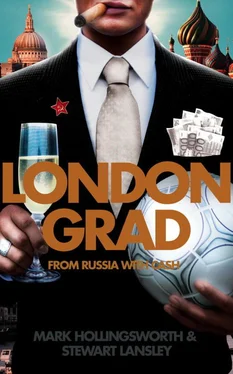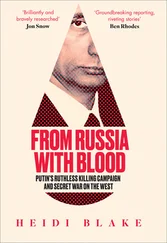1 ...6 7 8 10 11 12 ...103 Instead of a share-owning democracy, a newspaper poll in July 1994 revealed that only 8 per cent of Russians had exchanged their vouchers for shares in enterprises in which they worked. Moreover, because the assets being sold were massively undervalued, the successful purchasers obtained the companies for well below their real value. Indeed, the 144 million vouchers issued have been estimated to have valued the assets at a mere $12 billion. In other words, much of the country’s industrial and agricultural wealth was being sold for a sum equivalent to the value of a single British company such as Marks & Spencer.
In just two years, by the beginning of 1995, around half the economy, mostly in the shape of small- and medium-sized businesses, had been privatized. The next crucial issue in the ‘second Russian Revolution’ was how to privatize the remaining giant state-owned oil, metallurgical, and telecommunications industries that were still operated by former Soviet managers – the ‘red directors’, the Soviet-era bosses renowned for their corruption and incompetence who had managed the state firms – many of whom were laundering money and stashing away revenue abroad. Russia was still mired in a severe economic crisis with plunging share prices and rampant inflation. The indecisive and capricious Yeltsin was ill, often drunk and rarely in control, while the state was running out of money to pay pensions and salaries.
Taking advantage of the growing crisis, a handful of businessmen dreamed up a clever ruse that appeared to offer a solution. This was a group that had already become rich by taking advantage of the early days of Mikhail Gorbachev’s perestroika (restructuring), which, for the first time in the Soviet Union, allowed small private enterprises to operate. Led by a leading insider, Vladimir Potanin, the cabal offered Yeltsin a backroom deal known in the West as ‘loans for shares’. This was an arrangement (coming at the end of the voucher privatization scheme) whereby they would lend the government the cash it so desperately needed in return for the right to buy shares in the remaining state enterprises. In effect, Yeltsin was auctioning off the state’s most desirable assets. If the government subsequently defaulted on repaying the loans – which the scheme’s architects knew was inevitable – the lenders would keep the shares by way of compensation.
For Yeltsin, the plan provided much needed cash while on paper it did not look like the mass giveaway it turned out to be. Between 1995 and 1997, more than twenty giant state-owned enterprises, accounting for a huge share of the country’s national wealth, were offloaded in this way. In return, the government received a total of some 9.1 trillion roubles, about £1.2 billion at the time. One of the main beneficiaries of this deal was Boris Berezovsky.
Boris Abramovich Berezovsky was born in Moscow in January 1946 to a Jewish family. An only child, his father was a construction engineer and his mother a paediatric nurse. Berezovsky’s family were not members of the Communist Party and his upbringing was modest and for a time – when his father was unemployed for two years – he experienced poverty. ‘I wasn’t a member of the political elite,’ he later said. ‘I am a Jew. There were massive limitations. I understand that perfectly well,’ he told an audience of journalists at London’s Frontline Club in London in June 2007.
A mathematics whizz kid, Berezovsky graduated with honours from Moscow State University. In early 1969 he joined the Institute of Control Sciences, where he gained a PhD and worked for more than twenty years. Intelligent, precocious, and energetic, he is also remembered for being intensely ambitious. ‘He always raised the bar to the highest notch and went for it,’ a close colleague recalled. ‘He was always in motion, always racing towards the goal, never knowing or fearing obstacles… His mind was always restless, his emotions ever changing, and he often lost interest in what he had started.’ Another friend from this period said, ‘He has this attitude which he has maintained all his life – never stop attacking.’
This was corroborated by a fellow student, ‘He was a compressed ball of energy… Constantly in motion, he was burning with plans and ideas and impatient to make them happen. He had an insistent charm and a fierce burning desire and he usually got what he wanted.’
As a scientist, Berezovsky wrote more than a hundred research papers on such subjects as optimization theory and decision-making. He was a director of a laboratory that researched automation and computer systems for industry. The young mathematician craved prestige and focused his energy on winning prizes to get it. He was awarded the prestigious Lenin Komsomol Prize (an annual Soviet award for the best works by young writers in science, engineering, literature, and the arts) and then tried but failed to win the even more illustrious State Prize. According to Leonid Boguslavsky, a former colleague at the Institute, his dream was to win the Nobel Prize.
In 1991 Berezovsky left academia and was appointed a member of the Russian Academy of Sciences, an achievement he remains proud of to this day. He later boasted that there were only eight hundred members of the Russian Academy of Sciences and that even Leonid Brezhnev had wanted to be among that number.
Berezovsky married Nina Vassilievna when he was twenty-three. Within three years the couple had two daughters – Elizaveta and Ekaterina, both now in their thirties. Despite his academic achievements, Berezovsky initially had to scrimp to buy winter tights and school exercise books for his children. Perestroika offered him escape from his straitened circumstances. His first scheme involved selling software he had developed to the State Committee on Science and Technology. ‘We convinced them that it was a good product, and we sold tens of thousands of copies of this software. And those were the first millions of roubles that we earned, and a million roubles was a whole lot,’ he told his audience at the Frontline Club.
In 1989 Berezovsky turned to the automobile industry. ‘They stopped paying my salary, so I started a business,’ he recalled. ‘Every Russian had two wishes – for an apartment and a car. The women generally had the last say on the apartment; so I went into cars.’ [5] Speech to the Frontline Club, June 2007.
Initially, this involved selling second-hand Mercedes imported from East Germany. Then, taking advantage of the new freedom to travel, he went to West Germany. There he bought a used Mercedes, drove it back through almost non-existent customs, and sold it for three times what he had paid for it.
But the real source of Berezovsky’s early wealth came from exploiting his connections, gained through his academic work, with the Soviet Union’s largest car manufacturer and producer of the Lada, the AvtoVaz factory based in the industrial city of Togliatti. Off the back of his friendship with the factory’s Director, Vladimir Kadannikov, Berezovsky founded a company called LogoVaz, which took over responsibility for selling the Ladas. The effect was to separate production from sales in a way that maximized the profits from the business for Berezovsky and his partners. It was perfectly legal and it was a strategy widely deployed by directors of state companies and the new entrepreneurs at the time.
Berezovsky also went on to establish the country’s first chain of dealerships for Mercedes, Fiat, and Volvo, which he later referred to as ‘a complete service, with workshops, showrooms, and credit facilities. Really, we created the country’s car market. There was no market then; people won cars in lotteries or for being “best worker” or they applied and stayed on a waiting list for years.’ [6] Ibid.
Читать дальше
Конец ознакомительного отрывка
Купить книгу












